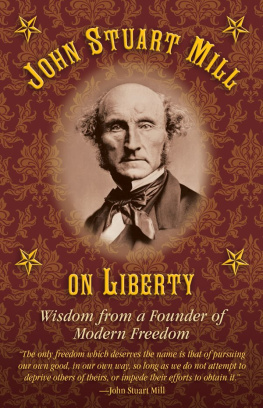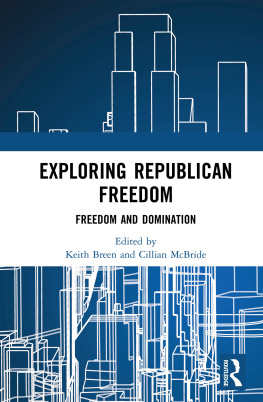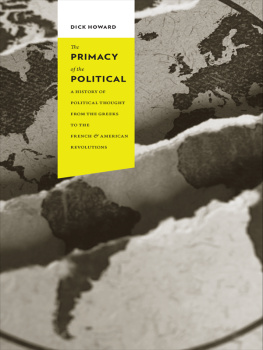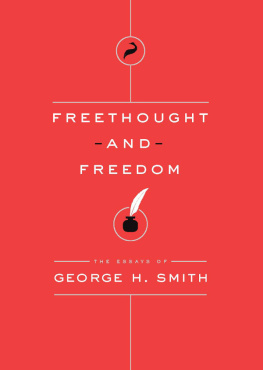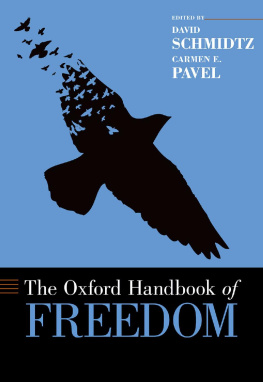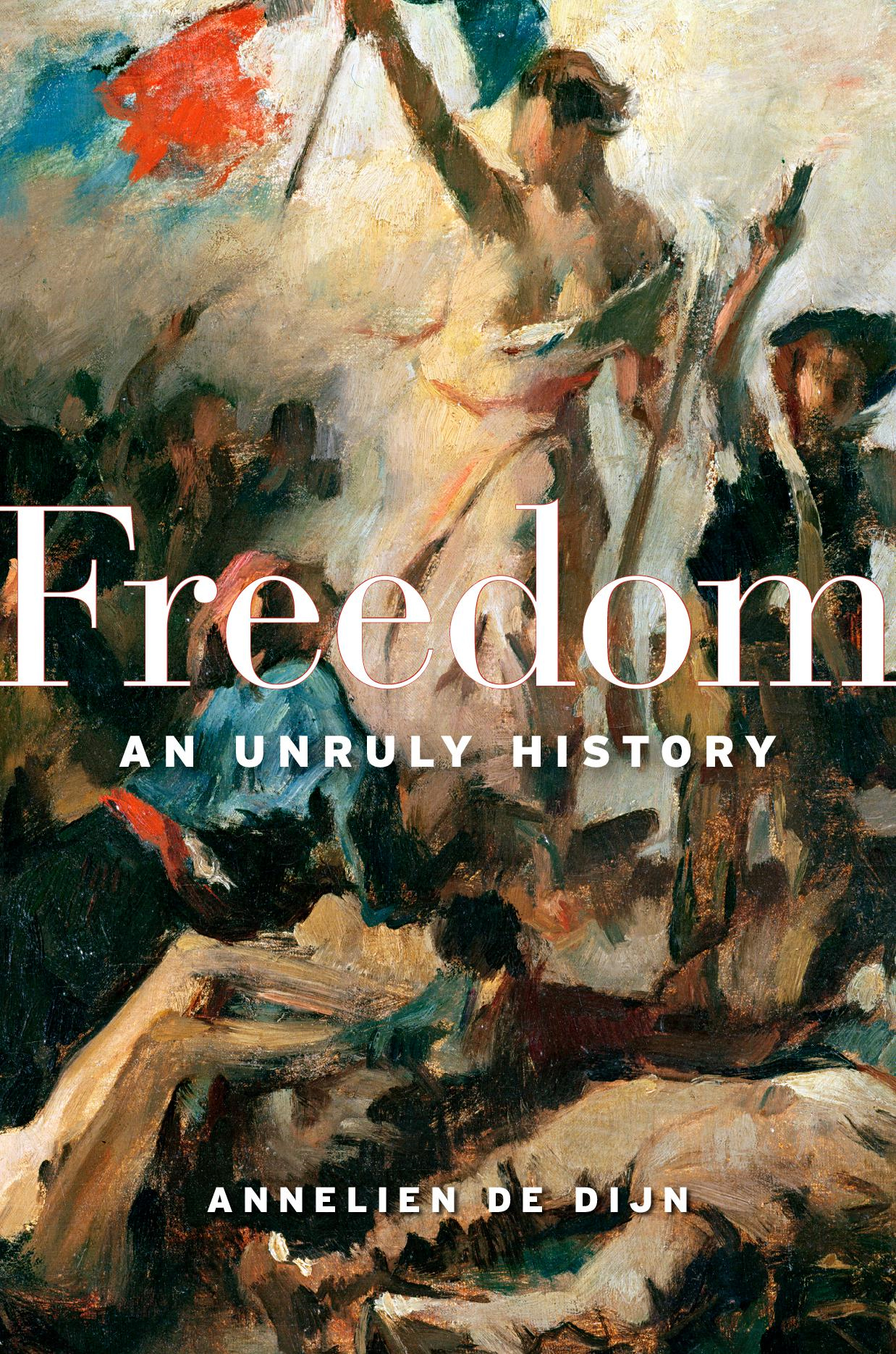Names: Dijn, Annelien de, 1977 author.
Title: Freedom : an unruly history / Annelien de Dijn.
Description: Cambridge, Massachusetts : Harvard University Press, 2020. | Includes index.
Subjects: LCSH: Liberty. | Power (Social sciences) | Government, Resistance to.
TODAY MOST PEOPLE TEND TO equate freedom with the possession of inalienable individual rights, rights that demarcate a private sphere no government may infringe on. But has this always been the case? Does this definition, whereby freedom depends on the limitation of state power, really offer the onlyor even the mostnatural way of thinking about what it means to be free in a society or as a society? And if not, how and why did our understanding of freedom change?
These are the questions this book sets out to answer. It does so by surveying over 2,000 years of thinking and talking about political freedom in what is conventionally known as the West. The story starts with the invention of freedom in ancient Greece and continues to the present. Along the way, I explore the ideas of boldface names such as Plato, Cicero, John Locke, and Jean-Jacques Rousseau. But the story also includes individuals less celebrated for their contributions to political thought, such as the nineteenth-century lexicographer Noah Webster, who was the first to provide a definition of liberty in American English.
The results of this investigation are startling. Our current conception of freedom must be understood as a deliberate and dramatic rupture with long-established ways of thinking about liberty. For centuries Western thinkers and political actors identified freedom not with being left alone by the state but with exercising control over the way one is governed. Theirs was a democratic conception of freedom: a free state was one in which the people ruled itself, even if it lacked a bill of rights, an independent judiciary, and other mechanisms to patrol the boundaries of legitimate state power. This democratic conception of freedom was developed by ancient Greeks and Romans and was revived in modern times by Renaissance humanists and their pupils, such as Niccol Machiavelli, Etienne de la Botie, and Algernon Sidney. As Sidney, the seventeenth-century English author of Discourses Concerning Government, put it, a people could only be free if it was ruled by laws of its own making.
These humanist ideas in turn inspired the American, Dutch, Polish, and French revolutionaries of the late eighteenth century. When these revolutionaries rebelled, they did so in the name of freedom. But the freedom they fought for was not the freedom to quietly enjoy their lives and possessions: it was the freedom to govern themselves in the way of the ancient Greeks and Romans. The foundation of all free government, the First Continental Congress stated in 1774, is a right in the people to participate in their legislative council.
Visual representations illustrate the remarkable longevity of the ancient, democratic conception of liberty. The history of the so-called cap of liberty is a case in point. In ancient Rome freed slaves were given a conical cap during their emancipation ceremony. In time the cap came to represent freedom in a political sense, appearing, for instance, on coins issued to celebrate the introduction of the secret ballot in Rome. Centuries later, in the 1760s and 1770s, New York rebels announced their defiance of British rule by erecting freedom poles decorated with these liberty caps. In the 1790s the symbol became a part of the daily attire of French revolutionaries, who wore red woolen caps to signal their attachment to liberty.
For over 2,000 years, then, freedom was equated with popular self-government. The coming chapters will show as much, in detail. It was only in the nineteenth and twentieth centuries that political thinkers in Europe and the United States began to propagate a different way of thinking about liberty. Freedom, many came to argue, was not a matter of who governed. Instead, what determined freedom was the extent to which one was governed. The German philosopher Johann August Eberhard was one of the earliest to make such claims. It was an unfounded prejudice, he wrote in 1784, to think that liberty was only to be found in democratic republics. The subjects of enlightened kings enjoyed just as muchnay, morecivil liberty than the citizens of self-governing states. As Eberhard noted, under King Frederick the Great, Prussians had greater religious freedom and paid lower taxes than the self-governing Swiss people.
What provoked this shift in thinking about freedom? Why was the democratic conception displaced by the idea that freedom depended on the limitation of government power? To the extent that historians ponder this question, they tend to find answers in long-standing trends in European history. Thus it is often claimed that the growth of religious tolerance in the Westan unintended consequence of the Reformationsparked the emergence of a new way of thinking about freedom, as identical with private independence. Another popular narrative attributes the shift in thinking about liberty to the emergence of a market economy in the seventeenth and eighteenth centuries. This supposedly led to a more enlightened conception of freedom, centered on the notion of natural rights. But contrary to widespread assumptions, neither the Reformation nor the transition to a market economy had much impact on the debate about freedom.
Instead, as this book shows, the shift to a new understanding of liberty was the outcome of a prolonged political struggle triggered by the Atlantic Revolutions of the late eighteenth century. These revolutions played a crucial role in establishing our modern, democratic political systems. But they also inspired a formidable reaction against democracy. Notably the French Revolutions descent into political violencethe Terrorturned many intellectuals and civic actors on both sides of the Atlantic Ocean against the effort to introduce bottom-up politics. The resulting counterrevolutionary movement propagated a new understanding of liberty, one that directly contested the democratic view by prioritizing the enjoyment of private independence. Eberhards remarks about freedom, for instance, were directed against the young republicans who wanted to democratize Prussia by introducing institutions modeled on the Swiss and American examples.
The counterrevolutionary redefinition of freedom, in turn, influenced new political movements that emerged in early nineteenth-century Europe, notably liberalism. Nineteenth-century liberals such as Benjamin Constant agreed wholeheartedly with conservatives like Eberhard and Edmund Burke that democracy was not only very different from freedom but also potentially harmful to it. Even as European liberals eventually came to accept democracy as a fait accompli, they continued to argue that democracy and freedom were different things. The best way to preserve freedom was not, they argued, to expand popular control over government but to create roadblocks against government interference in peoples lives. In a democratic context, then, individual liberty could best be protected by institutions and norms that curtailed popular power. This idea, it is safe to say, would have stunned earlier freedom fighters.


